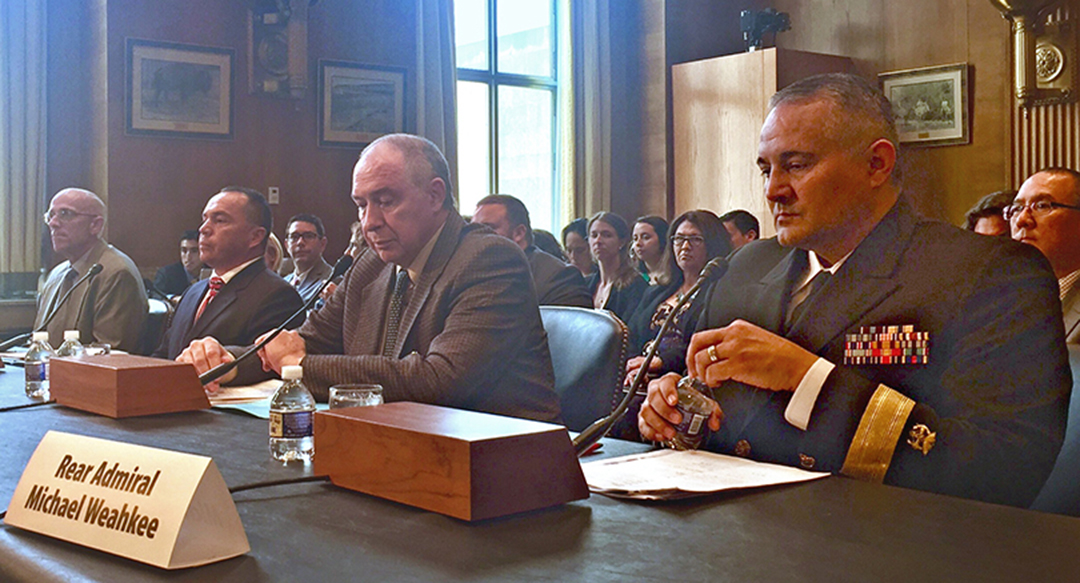Today I had the privilege of testifying before the United States Senate Committee on Indian Affairs at a hearing on the Government Accountability Office High-Risk List: Turning Around Vulnerable Indian Programs .

I updated the committee on the progress we have made since the last hearing on the GAO High-Risk List in September 2017. The Indian Health Service and the Department of Health and Human Services are steadfastly committed to implementing change across the agency to strengthen our ability to ensure quality health care. I was pleased to report during the hearing that we are pressing forward with improvements and our efforts are continuing to produce results.
IHS is working to address any and all risks to our mission. IHS has taken a comprehensive and integrated approach towards creating an oversight capability at headquarters to improve the quality of care and patient safety. IHS has made significant progress in implementing the IHS Quality Framework, which outlines how the IHS develops and sustains an effective quality program. We implemented corrective measures to mitigate high-risk in areas directly impacting patient care, including uniform standards across all agency hospitals and clinics for accreditation, credentialing, patient wait times, and Purchased/Referred Care (PRC) authorizations to improve quality and accountability across the system of care.
IHS is working with the Department of Health and Human Services to establish an Office of Quality that will be responsible for providing oversight for quality across the IHS health care system. It will oversee, direct, and evaluate agency-wide activities to ensure quality health care. Moreover, the Office of Quality will support IHS hospitals and health centers by providing a system of quality assurance to attain and maintain compliance with CMS Conditions of Participation and accreditation standards.
Earlier this year, IHS published the National Accountability Dashboard for Quality, a valuable reporting tool that will enable IHS headquarters and area offices to view key performance indicators for hospitals and health centers across the system. Over time, this will facilitate implementation and monitoring of quality care measures.
We are also looking at using alternative models of care to provide flexibility and better tailor services to meet the unique needs of each community we serve. For example, some locations may benefit from reallocating staffing and resources from expensive and lightly used inpatient services to ambulatory care center with 24/7 urgent care, or re-designation as a Critical Access Hospital. IHS currently operates five Critical Access Hospitals: Hopi Health Center, Parker Indian Hospital, Cass Lake Indian Hospital, Fort Belknap Health Care Center, and Crow/Northern Cheyenne Indian Hospital.
IHS leadership is committed to working in partnership with GAO. I have met several times with key GAO officials to discuss action plans for addressing the GAO recommendations. We were pleased to have GAO staff participate in two meetings of the Purchased/Referred Care Workgroup, where they engaged in discussions with tribal leaders about the GAO recommendations.
The IHS Purchased/Referred Care Program is working to ensure that IHS is able to provide access to our patients in the most cost-effective manner. Since the implementation of the PRC rates regulations in October 2016, the PRC program has saved $553 million. These savings have allowed PRC programs to pay for additional services and fund more medical priority levels than before, which improves access to care for our patients. IHS is currently conducting tribal consultation before finalizing updates to the PRC policy chapter in the Indian Health Manual.
You can read my full testimony on the IHS website or watch the full hearing online .
As the vice-chairman of the Senate Committee on Indian Affairs stated during the hearing, we must do better, and the barriers to quality care are not impossible to overcome. This hearing was an opportunity to highlight the progress we have made in partnership with tribes and tribal organizations, Congress, other agencies, and experts in delivering quality healthcare. I am very proud of the dedication and commitment of IHS staff at all levels of the agency who have made progress on these recommendations during this past year.
IHS is taking its challenges seriously and is continuing to take assertive and proactive steps to address them.
Related Content:



